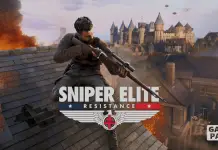To be an artist, or not to be? That is the question of “Grand Theft Hamlet,” a guns-blazingly funny documentary about two out-of-work British actors who spent a chunk of their COVID-19 lockdown staging Shakespeare’s masterpiece on the mean streets of “Grand Theft Auto V.” That version of the car-jacking video game is set in fictional Los Santos, an L.A. analogue where even the good guys have weapons and a nihilistic streak — the vengeful Prince of Denmark fits right in. Yet when Sam Crane, a.k.a. @Hamlet_thedane, launches into one of the Bard’s monologues, he’s often murdered by a fellow player within minutes. Everyone’s a critic.
Crane co-directed the movie with his wife, Pinny Grylls, a first-time gamer who functions as the film’s camera of sorts. What her character sees, where she chooses to stand and look, makes up much of the film, although the editing team does phenomenal work splicing in other characters’ points of view. (We’re never outside of the game until the last 30 seconds; only then do we see anyone’s real face.) This isn’t the first time “Hamlet” been repurposed as machinima — as in machine-cinema, or machine-animation, depending on whom you’re asking — a genre in which filmmakers hijack role-playing games to act out a different plot. (You’ll find a 2014 version made inside “Guild Wars 2” on YouTube.) This is, however, the first attempt I’m aware of that attempts to do the whole thing live in one go, no matter if one of the virtual actors falls to their doom from a blimp. As Grylls says, “You can’t stop production just because somebody dies.”
If you don’t know the tragedy going into the film, you won’t be able to piece it together from what’s onscreen. Ophelia barely registers; Gertrude gets less than two lines. The Bard’s story is only half the point. Really, this is a classic let’s-put-on-a-pixilated-show tale about the need to create beauty in the world — even this violent world — especially when stage productions in England have shuttered, forcing Crane, a husband and father, and Mark Oosterveen, single and lonely, to kill time speeding around the digital desert. “Wheeee,” one sighs, as their four-wheeler jounces over a curb. No judgment: During quarantine, I once put on an 8-bit bass fishing game just to listen to the water.
One day, their adventures take them to Los Santos’ Hollywood Bowl (ahem, Vinewood Bowl), and the sight of the empty amphitheater hits them as thunderously as the monolith gobsmacked the chimpanzees in “2001: A Space Odyssey.” They’ve embraced an existence of sloth and violence. Now, it’s time to evolve. “Anything that takes away from what I could cheerfully call the crushing inevitability of your pointless life,” Oosterveen says, chipperly.
The choice to do “Hamlet” in particular feels like settling on the first idea that comes to mind. It’s so obvious, it’s practically unconscious — like being told to crayon a great painting and selecting the “Mona Lisa.” To our surprise (and theirs), the play’s tussles with depression and anguish and inertia become increasingly resonant as the production and the pandemic limps toward their conclusions. When Crane and Oosterveen’s “Grand Theft Auto” avatars hop into a van with an anonymous gamer and ask this online stranger for his thoughts on Hamlet’s suicidal soliloquy, the man, a real-life delivery driver stuck at home with a broken leg, admits, “I don’t think I’m in the right place to be replying to this right now.” Paired alongside Shakespeare’s lines about grunting and sweating under a weary life, even the non-playable background extras seem imbued with a soul.
The piano score can hit the sentimentality too hard. Similarly, chunks of the framework narrative seem to have fallen out of the film. Crane frets over whether anyone from the National Theatre will watch the show. What is he hoping for? Did they actually come?
Meanwhile, within the game, a day lasts 48 minutes; a conversation might start in the sunshine and end at dusk. We’ve barely adjusted to that when the film itself starts screwing with our sense of time. It starts at a clip in January of 2020, and at one point reveals that the troupe has only four weeks to pull things together. OK, sure, but I did a double take after learning that the final production took place in July 2021. What’s the rush? Who is insisting?
I’ll call the film a documentary out of generosity. In truth, it feels closer to stage-managed reality TV. The big moments feel prompted, like when Crane and Grylls argue about his fixation on the game online.
“What about the kids? What about me?” she says, huffing away in her avatar’s spandex skeleton costume.
Thankfully, the story arc is designed so that chaos keeps barging in, most delightfully in the form of a scene stealer named ParTeb, a goofball from Tunisia who presents as a saucy green alien. Urged to audition for the show, ParTeb does a moving reading of the Quran. Then he decides he’d rather shoot people from an airplane.
Fair enough. In Los Santos, it’s more acceptable to wave a gun than recite verse. In the real L.A., that’s reversed, but it’s still hard to survive as an artist. Most of the creative people I’ve met in this town are hardscrabble hopefuls, so it’s irritating when an Irish player snidely dismisses Los Angeles as “ultra, ultra capitalist.”
I’d argue that both Los Angeles and Los Santos are places people go to so they can express who they really are — or pretend to be someone they’re not. They welcome freedom and adventure, whether from a newly out trans woman who seems more at ease wearing high heels in Los Santos than she does around her family, or a middle-aged female literary agent who auditions wearing her nephew’s bro-y avatar, a shirtless DJ.
The film’s most disorienting and wondrous realization, however, is that Shakespearean acting can exist even within “Grand Theft Auto’s” limits. The characters’ inexpressive faces are closer to Noh theater than to the Globe. But when the show’s first Hamlet, ambulated by an Oxford-trained actor named Dipo Ola, performs a few lines, he’s instantly more compelling than the sight of ParTeb shaking his rump. What a pity that Ola gets a real job and is forced to quit the play. And what a hoot that as Ola zooms away, he pops a cap in Oosterveen as a gesture of goodbye.
‘Grand Theft Hamlet’
Rated: R, for language and some violence
Running time: 1 hour, 29 minutes
Playing: In limited release Friday, Jan. 17




































